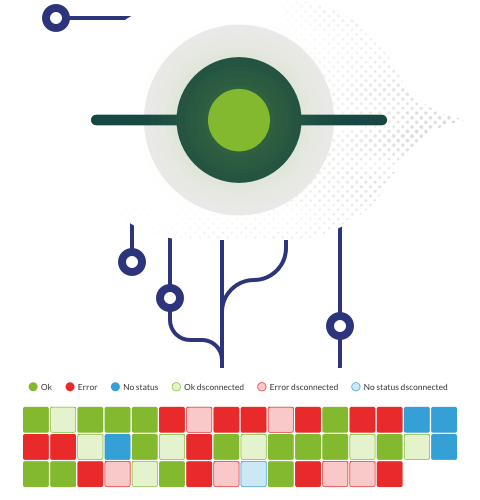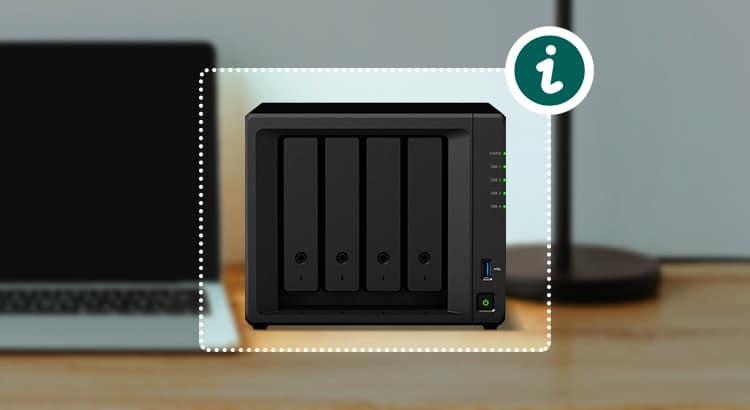What is a NAS server and what is it for?
Storage devices for networking, or NAS servers are in good health. And no wonder, since we have increasingly more data to save and more need to use them from different locations.
Traditionally, NAS servers have been considered a cheaper (and also more limited) alternative to other types of servers. However, NAS servers can also be used to carry out different tasks. But before we get into that, how about we find out more about what a NAS server is?
What is a NAS server?
A NAS server is a computer intended for data storage and use through a network.
Therefore, based on its definition, you may already conclude its main function. This type of device is designed to work like a large hard disk that, by being connected to a network, could be accessible from any location that enjoys connection to it. However, a NAS server, as we will see later, is much more than a hard drive.
NAS servers have grown in popularity at the rate that the use of applications and devices created to be used under the concept of “cloud” have done so. What happens is that, in this case, NAS servers would not be linked to the type of “cloud” managed by third parties (usually companies that offer this type of services), but would be a way to enjoy a kind of “Private cloud”, that is, storage that we could access from anywhere but that we would have under our control, locating said servers in our own company or, for more domestic use, in our own home.
That said, we can specify a little more what a NAS server is from the point of view of its components. In this sense, a NAS server usually has the usual components in any server, such as its own CPU, RAM memory and a series of hard drives depending on the storage needs, among others. In addition, it will have its own operating system and different applications, depending on the use you want to give it.
What is a NAS server usually for?
-Backup storage
One of the main applications of NAS servers is to store backups of files generated by different devices. It is, therefore, a way to centralize the backup copies of data that may be being created in different locations.
-Create your private cloud
Although most companies tend to turn to third-party cloud services, the option of maintaining a NAS server could also be interesting. With a NAS server, the computers that store the data remain under the physical control of the company and also not depend so much on the agility and state of service that a third party can provide.
-File sharing system
It is another of the common uses in companies. Instead of having the information spread over a multitude of computers, certain data is stored and made available to workers through NAS servers. In this line of thought, the options to establish permissions provided by the software being used will be important.
-Web server
A NAS server can perform different functions related to the web service. For example, it can support the main web server, work as a test server, or even perform web server functions on its own.
-VPN server
Another obvious use of a NAS server is to perform VPN functions. VPNs or Virtual Private Networks are virtualized networks in which we can work under special privacy conditions. They are usually widely used, for example in companies, to work from home as if we were doing it in the office itself.
-Multimedia storage
It is a more domestic use than the previous ones, but also very popular. Some people use a NAS server in order to store multimedia content that they will play on different devices, such as desktop or laptop computers, tablets, or televisions.
What to consider before buying a NAS server?
-Harware
In a NAS server, we will find components very similar to those we would find in another type of computer, so we will have to look at them as we would for other of our purchases. For example, both the CPU and RAM will be essential for you to work with agility. The specific choice will depend on the use you are going to give it. If you only want it as a storage device that you won’t access frequently, you won’t need a very powerful microprocessor or RAM; however, if you are going to use it to a wide extent, for example as a multimedia server, you will probably need more powerful components.
The section for storage deserves separate consideration. Here you should think carefully about the capacity you need, in order not to fall short in face of the future. Also, keep in mind that, although some NAS servers tend to incorporate hard drives, the most common thing will be that you have to purchase them separately.
-Software
No less important will be the software you have. Most often, each manufacturer has a specific operating system, so you should find out what this will be before purchasing the server.
Similarly, the ecosystem of applications available will depend on the equipment you purchase, so think carefully about the use or uses that you will want to give to your NAS server and what will be the different applications that you will be able to use on the server that you want to acquire.
And now, a little bit of monitoring
To finish off, don’t forget that one of the things you can (and in some cases certainly should) do with your NAS servers is monitor them.
Monitoring systems are responsible for monitoring IT systems (hardware, networks and communications, operating systems or applications, for example) in order to analyze their performance, and to detect and alert about possible errors.
And if we talk about monitoring, of course, we should talk about Pandora FMS. Pandora FMS is a flexible monitoring software, capable of monitoring devices, infrastructures, applications, services and business processes.
Would you like to find out more about what Pandora FMS can offer you? Find out clicking here .
If you have to monitor more than 100 devices, you can also enjoy a FREE 30-day Pandora FMS Enterprise TRIAL . Get it here .

Dimas P.L., de la lejana y exótica Vega Baja, CasiMurcia, periodista, redactor, taumaturgo del contenido y campeón de espantar palomas en los parques. Actualmente resido en Madrid donde trabajo como paladín de la comunicación en Pandora FMS y periodista freelance cultural en cualquier medio que se ofrezca. También me vuelvo loco escribiendo y recitando por los círculos poéticos más profundos y oscuros de la ciudad.
Dimas P.L., from the distant and exotic Vega Baja, CasiMurcia, journalist, editor, thaumaturgist of content and champion of scaring pigeons in parks. I currently live in Madrid where I work as a communication champion in Pandora FMS and as a freelance cultural journalist in any media offered. I also go crazy writing and reciting in the deepest and darkest poetic circles of the city.


















